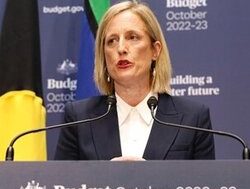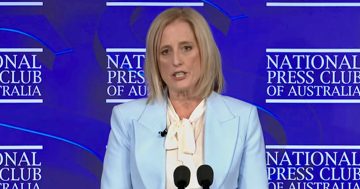Patricia Karvelas* says this penalty is hurting the economy as well as women.
 If women were to sit down and do the basic maths on how their lives would change financially after having children — not just in the first weeks and months, but for years and into retirement — I suspect the ugly truth of those figures may take away some of the joy of what should be one of the most profound and life changing moments.
If women were to sit down and do the basic maths on how their lives would change financially after having children — not just in the first weeks and months, but for years and into retirement — I suspect the ugly truth of those figures may take away some of the joy of what should be one of the most profound and life changing moments.
Last week’s federal budget provided sobering evidence of how motherhood as we currently structure it condemns women to a lifelong economic penalty.
It’s a penalty that we as a culture are too slowly realising hurts not just individual women but our economy more broadly.
Following the arrival of children, women typically make significant and long-term adjustments to their paid employment, Treasury confirms, while men’s employment remains largely unchanged.
The research shows women reduce their paid work hours by around 35 per cent across the first five years after the arrival of children.
Men’s hours of paid work drop only during the first month of parenthood before returning to previous levels.
Consider that: In 2022, the only dent kids make on their fathers’ working lives on average is for around a month, and then it’s back to business as usual.
While the gap in hours worked narrows as women get older, women who have had children still tend to work fewer hours than women without children and men (regardless of parenting status) into their 50s and 60s.
The research on the so-called “motherhood penalty” indicates that it is similar whether a woman is the primary earner in a household or not.
As Treasury notes:
“This implies that relative earnings prior to children has little influence over the way households allocate paid work following the arrival of children, and suggests that gendered norms are a strong driver of caring patterns in the household.
“This research also finds that mothers’ satisfaction with their work opportunities falls compared to fathers, and mothers are more likely than fathers to report that their family life affects work.”
The cost of caring
Importantly, research suggests the “role of flexible work” and the unequal allocation of domestic labour helps explain the motherhood penalty.
Women who had greater access to flexible conditions before having children are more likely to remain employed after having children, the budget papers explain.
“However, for women who remain employed, the hourly wage penalty is larger for women in more flexible occupations, likely reflecting foregone promotion opportunities.”
Finally, the research highlights the growing significance of the “motherhood penalty” in explaining the total gender earnings gap.
Over the past two decades, the gender earnings gap has fallen, but the motherhood penalty component has grown.
Women, Treasury reveals, are also more likely to pick up ad hoc caring responsibilities:
“For example, Treasury estimates that in households with dependent school-aged children, mothers reduce their hours worked by around 10 per cent on average in response to school holidays, but father’s hours decline by 6.7 per cent.”
Treasury also estimates that pandemic school closures saw mothers with school-aged children reduce their working hours by 1.4 per cent on average, while no meaningful change was observed for fathers.
Women’s time out of the workforce for caring responsibilities has an adverse impact on earnings — the “motherhood penalty” — but it can also lead to a “perception that women’s skills have depreciated, Treasury explains, “and can mean that women return to lower-status or lower-paid roles”.
These effects can compound, and result in women being paid less and getting fewer opportunities for career progression.
This is why good policy matters
It is in this context that policy really matters.
Good, well-designed policy has the capacity to shift the dial on this issue, and it is instructive that Peter Dutton’s opposition has now decided to back Labor’s expanded childcare scheme — which will allow women to work more hours — as well as the paid parental leave scheme’s expansion to 26 weeks.
It is a big pivot, especially on childcare, given the Coalition in government painted the expansion as a waste of money and too generous.
It signals that the culture might be finally shifting — and the frustrations women expressed at the ballot box in May are reverberating across the parliament.
Backing good social policy that lifts women up is becoming mainstream.
The Albanese government plans to increase the total paid parental leave available to parents to 26 weeks.
The inaugural Women’s Economic Equality Taskforce, chaired by Sam Mostyn, will examine the optimal model for 26 weeks and what mix of flexible weeks and “use it or lose it” for each parent will deliver the best outcome for families and encourage “more shared parenting”.
Policy analysts warn there is a risk that unless men are allocated more time under the scheme, fathers will continue to take two weeks’ leave and mothers will do the bulk, which would ultimately widen the gap between men and women.
Mostyn says there are many ways of sharing parenting — including fathers doing one day a week.
But there’s one overwhelming agenda here: to shift the sharing of parenting not only to take the pressure off mothers, but to lift their economic outcomes and deliver gender equity.
Gender equity won’t happen on its own — it will require careful decisions by the government.
We invest heavily in our girls in Australia, and we should.
We tell them they can do anything, and we know they can.
It’s time all policy shifted to enable that promise — to help women enjoy the lifelong benefits of their full and equal economic independence.
*Patricia Karvelas is the presenter of RN Breakfast and co-host of the Party Room podcast.
This article first appeared at abc.net.au











